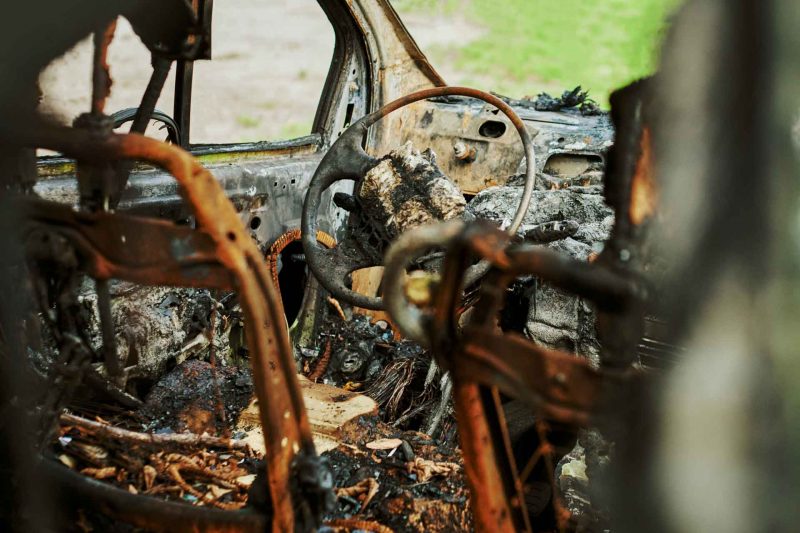Sitting around a campsite and watching a fire burn is an excellent way to relax at the end of the day. However, relaxing is the last thing you’ll do if the fire is in your RV.
A fire can quickly get out of control in an RV, and your RVing dreams could go up in smoke. You want to keep fires as far away from your RV as possible.
Today, we’ll share five ways your RV could burn up and how you can prevent it. Let’s get started!

Can an RV Catch Fire?
Most RVs consist of wood and other highly flammable materials. Even RVs with metal, like Airstreams, are still susceptible to fires. If a fire erupts inside an RV, the contents will fuel the fire and cause it to spread throughout the rig quickly.
RVs can catch fire for various reasons, but the biggest causes of fires are user error or mechanical malfunction. You must check your smoke detectors regularly to help keep your family and fellow campers safe while RVing.
Are RV Fires Common?
An estimated 2,000 RV fires occur annually. This is a drop in the bucket compared to the nearly 350,000 residential fires in a typical year.
Do RV fires occur? Absolutely. But are RV fires common? Absolutely not.
RV fires can be incredibly destructive and leave very little when they finish burning. Should a fire break out in an RV, an owner should expect their rig to be a total loss. All that will remain from the RV are the memories you and your loved ones hold in your hearts from your adventures.
How Long Does It Take for an RV to Burn Down?
Because RVs use a tremendous amount of lightweight wood materials, they burn incredibly fast. The clothing, decorations, and bedding inside an RV will accelerate the flames and cause them to spread.
This can result in an RV being completely engulfed in flames in a matter of minutes and burning to the ground in 10 to 15 minutes.
RV fires can burn so fast that firefighters must focus on containing them when they arrive. They typically focus on preventing it from spreading to other structures rather than putting it out. Once the fire burns through the materials feeding it, it’s only a matter of time before it extinguishes itself.
HOT TIP
Watch these YouTubers set an RV on fire to see just how quickly the flames can spread.
What Can You Do to Keep an RV Fire From Spreading?
If you want any chance of saving your RV when a fire erupts, keep it from spreading. This means having fire extinguishers readily available and knowing how to use them. These will be your best line of defense against a dangerous fire.
Everyone in your RV must know how to operate a fire extinguisher. You never know where you’ll be when a fire starts, and if you’re the only one who knows where the fire extinguisher is and how to use it, you could return to a pile of ashes where you parked your RV.
Check the expiration date on your fire extinguishers, too. You must inspect them regularly to confirm they are in good working order. You want to know they’ll do the job when you need to use them.
5 Ways Your RV Could Burn Down and How to Prevent It
There are a handful of ways that your RV could burn down. Since you likely want to avoid all of these, it’s crucial to know how to prevent them. Follow these tips, and you can help keep yourself and your RV safe from fires.
Cooking
If you spend much time in your RV, you will likely cook inside it. Cooking in an RV typically requires the chef to use an open flame. While this usually isn’t much of a problem in a residential kitchen, an RV kitchen is often a much smaller space.
How to Prevent It:
To prevent a fire from breaking out in your RV while cooking, you need to be extra careful where you set things around the kitchen. You could easily place a towel or potholder down next to the stove’s open flame. This simple mistake could quickly ignite the fabric and cause a fire inside your RV.

While you should always avoid distractions when cooking, it’s especially crucial when cooking in an RV. Failure to focus can be dangerous and cause a tremendous amount of damage to your RV.
Appliances
Your RV will likely experience wear and tear as it ages. However, when appliances wear down, they could cause a fire.
Parts can overheat or leak and cause a hazardous situation. A tiny spark from one of these appliances is all it takes to ignite a fire inside your RV. RV fridges are notorious appliances known for causing fires.
How to Prevent It:
If you want to protect your RV from an appliance fire, you must use reputable brands in your RV. Companies like Dometic and Furion make most of the RV appliances you see in RVs.
If you have an older RV and devices, it might be worth replacing them with newer versions before they develop any potentially dangerous failures. Also, be sure to troubleshoot any problems immediately. For instance, if your RV fridge isn’t cooling, there could be a bitter problem brewing.
HOT TIP
Did you know your propane RV fridge is a fire hazard when in tow?
Electrical Failures
If you’ve ever peeked behind false walls or coverings in your RV, you’ve likely found the rat’s nest of electrical wires making up your RV. These wires help you use many of the functions in your RV.
However, every wire has a connection at the start and end, which can lead to electrical failures. Electrical failures are common, especially in RVs, when users push their electrical system to its limits.
Using too much power on a circuit, improper wiring, and loose connections are all causes of electrical fires in an RV.

How to Prevent It:
One of the best ways to prevent fires from electrical failures is to watch for any signs of potential issues. Blown fuses, hot electrical outlets, and melting smells are all obvious signs of electrical problems in your rig.
These issues will not fix themselves and will likely only worsen with time. It would be best if you had a professional investigate the situation as soon as possible.
Campfire Embers
A roaring fire outside may be an excellent place to roast marshmallows and tell scary stories, but the embers of a campfire can be very dangerous. Hot embers can fly through the air and transfer heat. If an ember were to land on top of your RV, it could melt the roof or ignite items on your RV.
How to Prevent It:
The best way to prevent embers from becoming an issue for your RV is to keep your campfires away from your rig. You may discover that some campgrounds place campfire rings too close to where you’ll need to park your RV.
Chat with the camp host before you try moving the fire ring. You may find yourself in hot water if you move it without permission.
Lack of Maintenance and Inspections
You don’t have to own an RV for very long before you learn that they require a lot of maintenance and inspections to keep them in good shape. Aging tires, wheel bearings without proper lubrication, and other issues can cause fires in an RV while traveling. Several RVers have experienced avoidable RV fires had the owner correctly maintained the rig.

How to Prevent It:
The best way to prevent a fire due to a lack of maintenance and inspections is to follow the manufacturer’s maintenance schedule. Manufacturers typically include a detailed program for maintenance that an owner should follow.
If you follow this schedule, you can drastically reduce your chances of experiencing a fire due to not maintaining your RV.
Stay Safe and Prevent RV Fires
RV fires rip through RVs and leave very little behind when you extinguish the flames. This can be devastating and derail any future travel plans.
You must take fire safety seriously and plan how to respond should you experience a fire. Teach everyone how to use fire extinguishers and check their smoke detectors regularly. If you do, you can stay safe and prevent RV fires from destroying your rig and future RV adventures.
Do you have fire extinguishers in your rig?
If You Want the Latest Travel News, Join Our Mailing List
Don’t rely on biased RV industry news sources to keep you informed. Stick with Nomadic News. We publish articles and breaking stories that matter to you every weekday.










